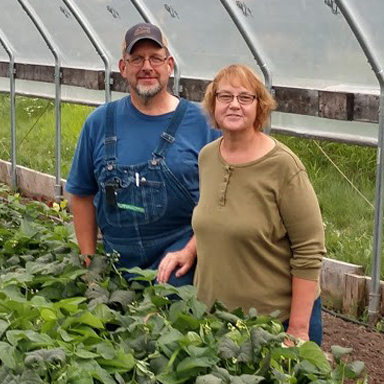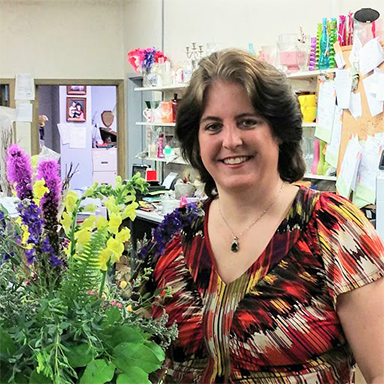Ever dream of starting your own business? If you have, you are not alone. Small businesses form the backbone of our economy. They provide employment opportunities and contribute to the health and vibrancy of the communities they are in.
There are many ways to become a business owner. Some become franchise owners, others become tech entrepreneurs, but many start out leveraging something they are great at and enjoy doing regularly – their hobby.
As part of this year’s DIRT stage presentation at the Minnesota State Fair, Organic Bob, Broadway Floral, and Ida Valley Farm shared insights and advice on turning your hobby and interest into a successful small business.
Our customer panelists love helping their customers, to see them smile, and to make a personal connection with them. All of them get a deep sense of satisfaction from knowing their service and products positively impact the lives of their customers. Despite their core similarities, the path each of them took to business success differs; each providing a unique perspective on turning a hobby/interest into a small business.
A friendship that sparked a business idea
Randy and Bob had an interesting start to their joint business. Randy was into compost tea treatment whereas Bob had a landscaping business. “I had a rental property that I owned, and Bob came out to do a bid,” Randy said. He did not end up hiring Bob but their common interest in permaculture laid the seeds to what has now become a successful organic lawn care business.
“It started as a conversation where I told him I wanted to sell compost tea treatment but did not know where to start. Our arrangement was that he would sell compost tea to his landscaping clients, and I’ll execute on the sale,” Randy elaborated.
For Randy, having his own business was not something he had intended from the beginning. In fact, Randy took a no-risk approach to growing his business. Neither he nor Bob quit their day job until the business became profitable. That meant that he was able to funnel his profits back into expanding the business and grow it organically until it became financially secure. When it did, Randy quit his day job. That was the obvious choice because to Randy, “when you enjoy what you are doing, it does not seem like work.”
Devoting full-time to his business was the right move because demand for organic lawn care is expanding rapidly. The business saw a 65% growth this year. “We have never had a problem getting business. Our clients come to us. Our challenge is delivering during the date-window and do it right for every customer.” This means hiring and training seasonal staff is critical to business growth.
But in Minnesota where winters are long, staffing remains a main problem in his line of business. This year, Randy will be taking on a full-time operations manager, which he hopes will solve some of his staffing challenges.
The seasonality of the business also come with unique financial challenges such as running a deficit for the first four months of the year as they prepare for lawn care season. “Our banker solved the problem by giving us a line of credit, which eased our financial stress. And we were able to pay it back by mid-June.”
Also following the advice of his banker, Randy applied for Bremer’s Edge Loan, an online product that extends credit to small business owners, while he was abroad in Mexico. An early adopter of Edge Loan, Randy said the loan helped him grow his business, “that was about as easy as it can possibly be and made a lot of difference to our business.”
When it came to choosing a bank for their business, Randy was deliberate in his choice. “We wanted a better values-match between Organic Bob and our bank. We work to a triple bottom line where we care about profits, people and the environment. It was important that our bank aligned with our values. And when we found Bremer, we were very happy.”
His advice: “As a busy small business owner, there just isn’t any time. You want to be working on opportunities, not problems. Find people who can help you solve problems. And if you have an opportunity to start a business, start it anyway you can.”
The reward is the smiles on their faces
For Jeff and Jane, farming is in their heritage. Both came from a farming family and was something they were both familiar with. and something she enjoyed doing as a hobby. They currently own 4 acres of land that produce mainly vegetables and some berries. Jane sells their produce year round and practices sustainable agriculture habits such as using cover crops when they are not growing vegetables. They sell their produce at the Alexandria Farmers’ Market during the summertime and sell to an online market and restaurants during the wintertime. A key highlight of owning a business is seeing the smiles on their customers’ faces knowing they are eating healthy and nutritious produce.
As someone who enjoys working outside and interacting with her customers, the decision to turn her hobby into a business came naturally to Jane. “I had a little more time and thought I’d give it a shot to see what we can do with it,” Jane explained.
While Jane devoted more of her time into the business, Jeff continued his full-time job, providing the financial flexibility to funnel their profits into growing the business. They sought financial advice from a banker when they were serious about transitioning from a hobby to a business and kept their business finances separate from their personal finances. This meant starting small and the decision to grow their business gradually allowed them to remain debt-free.
When they were first starting out, Jeff and Jane were surprised to find that so many people were willing to share what they know. Despite the ease of finding information online, “people are still the most valuable resources,” Jane said. Developing a system early on so that they can run things more efficiency was also something Jane wished she had done when starting the business, “we made a big garden when we first started but there is so much more to farming than just having a garden.”
Their advice: “Be prepared for a lot of work. Go to conferences and go to other farms to see what they are doing. Ask a lot of questions. And don’t be afraid to try something different. Learn from your mistakes and don’t be afraid to change directions when you fail.”
It’s like coming home
Jodi’s business journey was a little different. Unlike Jeff, Jane, and Randy, Jodi purchased an existing floral shop. Like Jeff and Jane, floral arrangement was familiar to her. She went to school for floral design and worked as a florist for many years. When a change of life event motivated her to start her own business, the timing couldn’t have been more perfect. “I saw there was a floral shop for sale in Alexandria. I graduated from here. For me, it was like coming home.”
Her decision to purchase an existing business was driven by practical reasons. “Starting from scratch is not easy. Marketing is hard and it is expensive. For most people, starting from scratch is the easiest financially. But we qualified and got a decent size loan. I just love that I was able to walk into a turnkey operation,” Jodi explained.
When working with a banker, Jodi said doing your homework such as evaluating property value is important. She put together a business plan that involved items such as projection of future cash flow, market analysis, collateral, and met with instructors at a business tech college to consult with them. Jodi came prepared to address any questions concerning her business plan when she met her banker.
Part of buying a business was also showing that she can run it successfully. “One of the previous owners had agreed to a decent contract for deed that covered part of buying the business that the bank did not finance.” Before the former owner would sign the agreement, Jodi had to show her that she could do a good job running a floral business. To demonstrate commitment, she spent several weekends for a few months at the store getting to know the staff, teaching them, and learning from the previous owner.
Jodi is an entrepreneur at heart and over time, she added new revenue streams to her growing floral business. For instance, a gift store in her area went out of business and Jodi decided to fill that need by selling gifts at her floral shop. Flexing her creative and artistic muscle, Jodi recently added a personalized laser engraving service to her business. In fact, she enjoys laser engraving so much she now considers it her hobby.
One of the challenges to owning a floral business is online competition. To Jodi, the internet is one of the best and worst things for her industry. “When you order online, you are overpaying the middle-person and people do not necessarily know that,” Jodi explained. She educates the public on this subject on her website, where she explains the benefits of buying from local businesses.
Her advice: “Your business needs to be a passion. You need to like people and not be driven solely by money. It doesn’t have to be a hobby, but it is all about loving what you do. And be careful about burnout.”
The reward for all of them is clear – managing your own business is challenging but being able to make your own decisions, having personal control over successes and failures, and feeling a sense of accomplishment make the struggle all worthwhile. And having the freedom that comes with being your own boss is just the cherry on top.



